February 21, 2020
Air Date: February 21, 2020
FULL SHOW
SEGMENTS
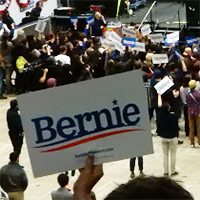
Bernie Sanders on Climate
/ Anna SaldingerView the page for this story
On the eve of the New Hampshire primary, some 7500 people packed into Whittemore Arena in Durham, New Hampshire for a Bernie Sanders rally, complete with a concert. Living on Earth’s Anna Saldinger reports on attendees’ support for the Democratic presidential candidate and his proposed iteration of the Green New Deal, and revisits Senator Sanders’ decades-long history with climate issues. (07:43)
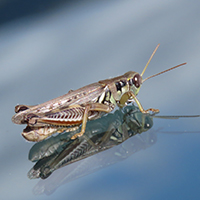
Beyond the Headlines
/ Peter DykstraView the page for this story
Environmental Health News editor Peter Dykstra joins Host Steve Curwood to discuss the worrying decline in insect populations, a new Republican call for climate action, and the new Chief of Staff at EPA. In the history calendar, it has been 13 years since Bill O’Reilly said in an interview that he believed in climate change, only to later double back. (04:03)
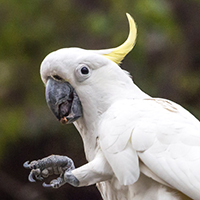
BirdNote®: Left Foot or Right? Handedness in Birds
/ Michael SteinView the page for this story
More than three quarters of humans are right handed, regardless of culture or where we live in the world. Scientists haven’t really figured out why our species has such a dominance for right handedness but they have found a similar preference in other species. BirdNote®’s Michael Stein reports. (02:06)
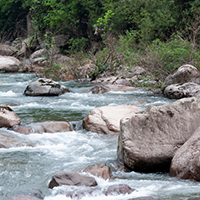
The Place Where You Live: Tianmushan, China
/ Lindsay ShenView the page for this story
Living on Earth gives a voice to Orion Magazine’s longtime feature in which readers write about the places they call home. This week Lindsay Shen writes about the refuge her family found in the cool, clear streams of the mountain village of Tianmushan, China. (05:37)

China’s Single-Use Plastics Ban
/ Jenni DoeringView the page for this story
As one of the world's biggest users of plastic, China recently unveiled a major plan to phase out single-use plastics across the country. Living on Earth’s Jenni Doering spoke with Ma Jun, founder and director of the Institute of Public and Environmental Affairs, about how the ban could help alleviate China’s growing plastic waste problem. (06:29)

Armistice for Hippos and Crocs
/ Mark Seth LenderView the page for this story
In Sekenani River in Maasai Mara Park, a pod of hippopotamuses and a bask of crocodiles keep a cautious truce. Mark Seth Lender, Living on Earth's Explorer-in-Residence, describes the encounter. (03:24)
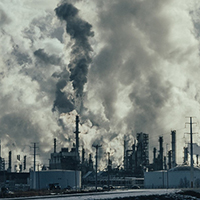
Kochland: The Secret History of Koch Industries and Corporate Power in America
View the page for this story
Much of the anti-climate policy efforts in the U.S. can be traced back to one powerful man, Charles Koch, who sits at the helm of a fossil fuel-based corporate empire. Christopher Leonard, author of “Kochland,” spoke with Host Steve Curwood about how Charles Koch and his massive company have profited from secrecy and worked to thwart climate policy and stamp out the moderate wing of the Republican Party. (17:40)
Show Credits and Funders
Show Transcript
HOST: Steve Curwood
GUESTS: Ma Jun, Christopher Leonard, Lindsay Shen
REPORTERS: Peter Dykstra, Mark Seth Lender, Michael Stein
[THEME]
CURWOOD: From Public Radio International – this is Living On Earth.
[THEME]
CURWOOD: I’m Steve Curwood.
Democratic presidential hopeful Bernie Sanders is winning so far on a platform that includes reining in climate change.
SANDERS: Look at what went on in California in the terrible wildfires that took place there. That is the future, not only of our country, but of the world unless we get our act together.
CURWOOD: Also, how oil and gas giant Koch Industries weaves a web of influence over climate policy.
LEONARD: The company headquarters is a dark limestone building with black windows. And that's not accidental. That really reflects this firm's modus operandi. The secret to their success is that they know more about the world than other people, and then they execute on what they know, to their benefit.
CURWOOD: That and more this week on Living on Earth – Stick Around!
[NEWSBREAK MUSIC: Boards Of Canada “Zoetrope” from “In A Beautiful Place Out In The Country” (Warp Records 2000)]
[THEME]
Bernie Sanders on Climate
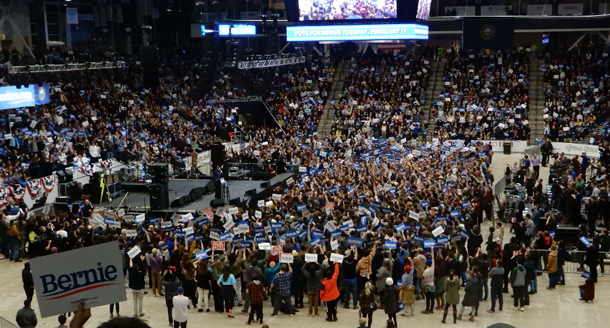
Representative Alexandria Ocasio Cortez’s speech revved up the crowd before she introduced Senator Sanders. (Photo: Isaac Merson)
CURWOOD: From PRX and the Jennifer and Ted Stanley Studios at the University of Massachusetts Boston, this is Living on Earth. I’m Steve Curwood.
As we go to broadcast, Vermont Senator Bernie Sanders is the front runner in the Democratic primary race for President, after a virtual tie in Iowa and a win in New Hampshire. Key to the plurality Senator Sanders commands is a core group of young voters who cite his long record of advocacy for environmental protection. For a look back at that record and how it is playing with young supporters of his bid for the White House, Living on Earth’s Isaac Merson and Anna Saldinger headed to a Bernie Sanders election night rally in Durham, New Hampshire. Anna Saldinger has our story.
[CHEERS]
SALDINGER: Senator Bernie Sanders took the stage in front of a raucous crowd of about 7500 supporters. He laid out his plan for the presidency, voiced concern for the environment and offered a solution, his vision of the Green New Deal.
SANDERS: Look at what went on in California in the terrible wildfires that took place there. That is the future not only of our country, but of the world unless we get our act together. And I'm proud to tell you that our campaign has introduced the most comprehensive climate change proposal ever introduced.
[CHEERS]
SALDINGER: The University of New Hampshire rally reflected the demographic of Bernie's supporters, with a crowd that skewed young. Many of his supporters were not alive in 1986 when Bernie was serving as mayor of Burlington, Vermont. Even back then he voiced concern for the environment and criticized what he saw as misplaced national spending.
SANDERS: The environment is precious, all of us agree on that. There's no question about that. What we need now is leadership all over this country to say to Mr. Reagan, the Democrats and the Republicans in Congress, Hey, stop spending your hundreds of billions on the military and overthrowing the government of Nicaragua, let's deal with the environment. Let's not cut back on environmental protection.
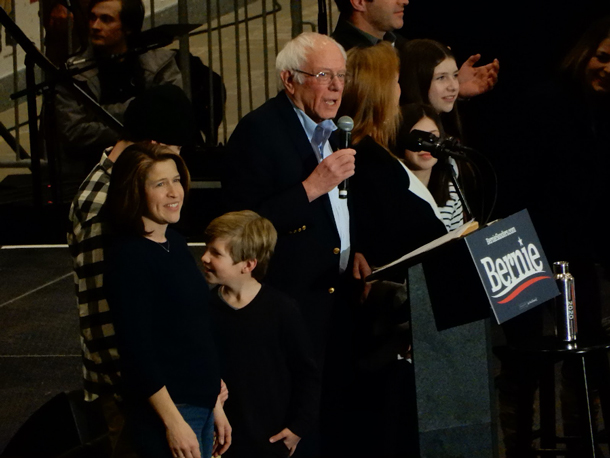
Bernie’s family joined him on stage at the beginning of his speech. (Photo: Isaac Merson)
SALDINGER: Bernie was early to sound the alarm about environmental degradation.
SANDERS: We face, as all people know, an ecological crisis in our time, whether it's acid rain, the destruction of the ozone layer, the greenhouse effect.
SALDINGER: He was elected to Congress in 1991, and eventually served on the Senate Committee for Energy and Natural Resources, starting in 2007. He often spoke about the urgent need to reduce our dependence on fossil fuels and create a green economy.
SANDERS: And I must respectfully disagree with my friends who say that there will be terrible economic implications if we do those things. The truth is the converse: if we do not act boldly, there will be terrible economic implications. If we act boldly, we can create millions of good paying jobs, breaking our dependency on fossil fuel.
SALDINGER: He and former California Senator Barbara Boxer had recently introduced the proposal in the Senate. And he stressed the need to listen to warnings from scientists.
SANDERS: The important issue to understand right now is that according to the scientific community, we stand the danger of seeing the planet Earth temperature rise by eight degrees Fahrenheit by the end of this century. If that happens, and we've talked to many of the leading scientists who study this issue, what they are telling us is this will cause catastrophic -- underline -- catastrophic damage to the planet. And my fear is that if Congress does not get our act together, you're going to see more and more extreme weather disturbances, more and more problems, which will cost this country and this planet a hell of a lot more than the legislation that Barbara Boxer and I have introduced.
SALDINGER: These days Bernie is pitching the green New Deal, a broad-reaching plan that would rein in greenhouse gas emissions, create millions of green jobs and support vulnerable populations. A plan of this scale takes a lot of money, and Bernie says he'll pay for it by reducing military spending and raising taxes on wealthy individuals and companies.

The crowd kept the energy going during a Strokes concert after Bernie concluded his speech. (Photo: Isaac Merson)
[CROWD CHEERS]
SUNFLOWER BEAN: Give a hand up for Bernie Sanders the next President of the United States.
SALDINGER: The election eve rally in New Hampshire included a concert from a band called Sunflower Bean. And we pulled rallygoers aside to ask about the Green New Deal and their faith in Bernie as a climate reformer.
VOTER 1: The majority of my concern is about the environment and Bernie seems like he's got the most support and the best plan for it. It's mostly that he's stood firm for all of his goals his entire career. He has always done what he believes in and stays to it.
VOTER 2: And the Green New Deal is, it involves economics as well. It involves, you know, foreign policy. It involves, you know, obviously the climate. So, you know, anything that I care about can be traced back to that.
VOTER 3: I mean look, like the, the only off ramp we have towards like a course of like ecological ecological Armageddon is, I think, a Bernie Sanders presidency. Like, it's hard to imagine us staving off ecological collapse without the kind of ambitious policies we see in the Green New Deal. And Bernie is the only one offering that, right?
SALDINGER: Critics say that Bernie's plan is too expensive and ambitious, but supporters believe he has the best plan.
VOTER 4: It is feasible because when you see how many young people here are supporting things like climate, and specifically the Green New Deal, it's what the new generation that's coming up want. But outside of that, it's our only hope at saving many of the species on Earth including humanity.
VOTER 5: I think it might be tough to get support from Congress, especially if it's not flipped, if the Senate's not flipped. I feel like people will be upset initially with how much it's going to cost and if we actually were able to implement changes I think a lot of people would be taken out of their comfort zone and they wouldn't like that. But I think in the long run, it's worth the investment.

Supporters hopped a fence and skated around on the ice as they left the rally. (Photo: Isaac Merson)
SALDINGER: To cap off the night, Bernie introduced a second band.
[CHEERS]
SANDERS: It gives me a great deal of pleasure to introduce . . . The Strokes!
[THE STROKES MUSIC]
SALDINGER: The lights went down, the fog machine cranked up and people began to dance. The electricity of the rally continued and a group of rally goers jumped up on stage. And then one of them dropped down into the waiting arms below and crowd surfed. As the concert began to wind down, we went back into the frigid night. There, we found something unexpected.
[SOUNDS OF PEOPLE ON THE ICE]
SALDINGER: Dozens of supporters jumped over a short fence to slide around on a small frozen pond. I grabbed one of them and asked why they got on the ice.
VOTER 6: This is such an important event, monumental so many people's lives, like, it's not just about us anymore. It's about everybody else and just sympathizing and just having morals this point, really.
SALDINGER: It was after midnight when we left the rally, and though it was late on a Monday, many people lingered, eventually forming a colossal group hug on the ice. It was a small moment on a frozen New Hampshire pond, but one that speaks volumes about the passion that Sanders supporters bring to his campaign.
For Living on Earth. I'm Anna Saldinger in Durham, New Hampshire.
CURWOOD: That story was produced with the help of Isaac Merson.
Related links:
- A complete video of the rally
- Bernie Sanders' Green New Deal plan
- A write-up of the Green New Deal in the 2020 election
- Check out Sunflower Bean’s music here
- More about The Strokes and their upcoming album
[MUSIC: The Strokes, “Last Nite” on Is This It, by The Strokes, RCA]
Beyond the Headlines
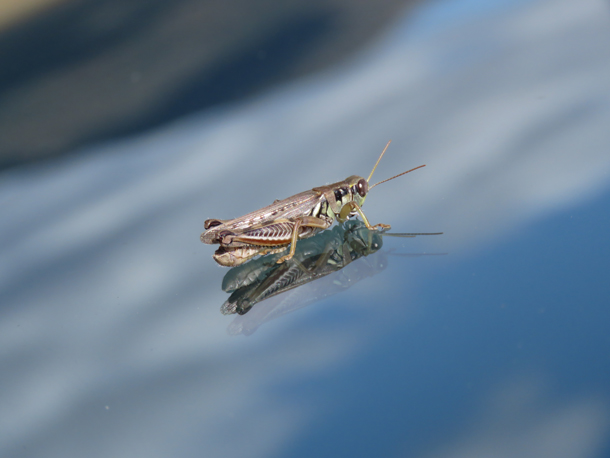
Studies which scraped windshields and license plates in Denmark and England have shown up to an 80% decline in insects in the last 30 years, in a continuation of a worrying trend of insect disappearance. (Photo: Loren Chipman, Flickr, CC BY-NC 2.0)
CURWOOD: It's time for a look beyond the headlines now with Peter Dykstra. Peter's an editor with environmental health news that's EHN.org and daily climate.org on the line now from Atlanta, Georgia. Hi there, Peter. How ya been?
DYKSTRA: Hi, Steve. Welcome back. You know, everyone who has a car has had the experience of clearing carcasses of insects maybe by the hundreds at a time from the car windshield. A few of those critters may have given their lives for science.
CURWOOD: For science, Peter?
DYKSTRA: Yes, the tiniest roadkill was measured over a course of 20 years in a Danish study: the bugs on the windshield have declined. So they scraped many, many more bugs off in the 1990s than they did recently. And the decline is an alarming 80% in some cases. There was a corresponding drop in a study that was done in the UK of insects scraped off of license plates of cars.
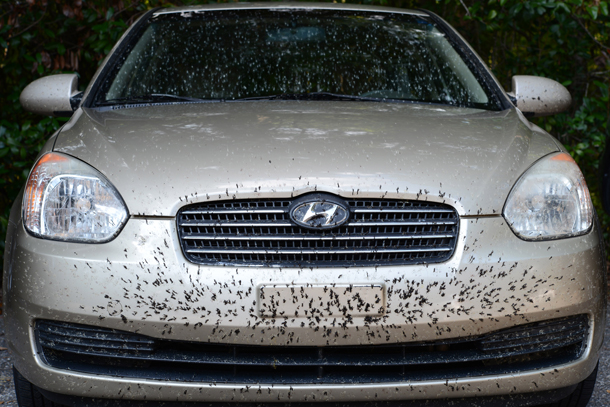
Bugs on a Florida windshield (Photo: Tim Donovan, Florida Fish and Wildlife Service, Flickr, CC BY-ND 2.0)
CURWOOD: Of course, we've seen research that's also been done in certain wild areas of Europe saying that bugs are gone down by 70, 80%.
DYKSTRA: Yeah. And it has some very, very serious implications. About three quarters of our food crops are pollinated by insects. There were birds like swallows, and Martin's in the European studies that were documented to have similarly plunged in population, because insects are their food source.
CURWOOD: That's right. What else to have for us, Peter?
DYKSTRA: There's some signs that at least a few key Republicans, including the House Minority Leader, Kevin McCarthy, are beginning to warm to global warming.
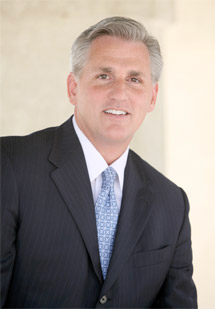
Representative Kevin McCarthy is one of many Republican members of Congress beginning to acknowledge anthropogenic climate change, and has proposed several “Innovation Initiatives” including further funding for carbon capture technology, and the “Trillion Trees” initiative. (Photo: Wikimedia Commons, Public Domain)
CURWOOD: Really What's going on?
DYKSTRA: Well, we're in an election year with not only the presidency but one third of the Senate, the entire house of representatives and 11 governorships up for contention. Republicans are worried that the Democrats could retain the house while taking control of the Senate. And of course, there's the White House up for grabs as well. Republicans seem to be in the very first stages of acknowledging that not acknowledging climate change is a political liability. McCarthy and other Republicans are beginning to push innovation initiatives. They include carbon capture, which is, of course a gift to the coal industry. We've invested a few billion in it so far with little result, but they want to keep trying. And, of course, the worldwide trillion trees initiative that President Trump mentioned in his State of the Union address. The Republicans are all for that one too
CURWOOD: Something tells me that not all the Republicans are aboard this though.
DYKSTRA: Oh, not at all. There are nonprofits like the Club for Growth, an influential libertarian conservative group, and many members of Congress that want to battle back and want nothing to do with anything that smacks of energy conservation or efforts to curb climate change.
CURWOOD: Hey Peter, let's take a look back now and history and tell me what you see.
DYKSTRA: We want to go back to February 24, 2007. Bill O'Reilly the perpetually angry talk show host at Fox, up until a few years ago, sat for an interview with the late Mike Wallace on 60 minutes and in an uncharacteristic moment Riley says he believes in global warming.
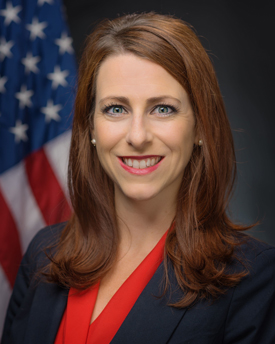
Mandy Gunasekara, who prominently opposed the United States involvement in the Paris Climate Accord, and most recently founded a pro-Trump educational non-profit, was recently named Chief of Staff for the EPA. (Photo: Texas Public Policy Institute, Public Domain)
BILL O'REILLY: Global warming is here. All these idiots who run around and say it isn't here, that's ridiculous.
DYKSTRA: Now he hasn't he never said it after that. O'Reilly left Fox in 2017 in a sexual harassment scandal and Rupert Murdoch, Murdoch is still running the company was also an advocate for climate change at one point promising that his News Corp would become 100% carbon neutral. That's another promise that's been lost to ideology.
CURWOOD: Thanks Peter, Peter Dykstra is an editor with environmental health news at EHN.org and dailyclimate.org. We'll talk to you again real soon.
DYKSTRA: All right, Steve, thanks a lot. Talk to you soon.
CURWOOD: And there's more on these stories at the Living on Earth website, LOE.org.
Related links:
- The Guardian | “Car ‘Splatometer’ Tests Reveal Huge Decline in Number of Insects”
- Learn more about the congressional Republican Innovation initiatives
[MUSIC: Billy Childs Ensemble, “Scarborough Faire” on Lyric, traditional/arr.Billy Childs, Lunacy Music]
CURWOOD: Coming up – Residents in Tianmushan, China work together to clean up their polluted rivers. That’s just ahead on Living on Earth.
ANNOUNCER: Support for Living on Earth comes from Sailors for the Sea and Oceana. Helping boaters race clean, sail green and protect the seas they love. More information at sailors for the sea dot org.
[CUTAWAY MUSIC: Rob Curto, “Baiao E Bacalhau” on Forro For All, by Rob Curto, Forro For All]
BirdNote®: Left Foot or Right? Handedness in Birds
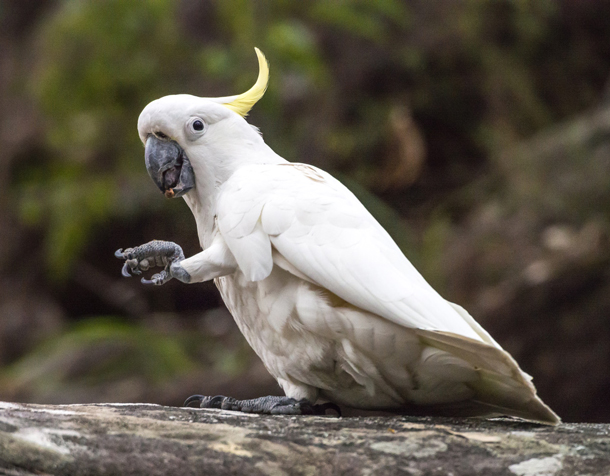
The sulfur crested cockatoo using its left hand based on the orientation of its vision. (Photo: Simon Tout CC)
CURWOOD: It’s Living on Earth, I’m Steve Curwood.
[BIRDNOTE THEME]
CURWOOD: More than three quarters of humans are right handed, regardless of culture or where we live in the world. Scientists haven’t really figured out why our species has such a dominance for right handedness but they have found a similar preference in other species. BirdNote’s Michael Stein reports.
BirdNote®
Left Foot or Right? Handedness in Birds
Imagine you’re about to shake hands, but with a Sulphur-crested Cockatoo.
[Sulphur-crested Cockatoo calls, https://macaulaylibrary.org/asset/234725, 0.05-.07]
Should you offer your right hand or your left?
You should hold out your left hand. That’s because most Sulphur-crested Cockatoos are left-footed.
[Sulphur-crested Cockatoo calls, https://macaulaylibrary.org/asset/234725, 0.05-.07]
In complex tasks like manipulating a piece of fruit, these intelligent birds work intently with their feet. A parrot’s eyes are located on the sides of its head. So, if it wants to look at something -- say, a delicious piece of fruit -- it has got to cock its head one way or the other do it. And if it looks with its left eye, then uses its left foot.
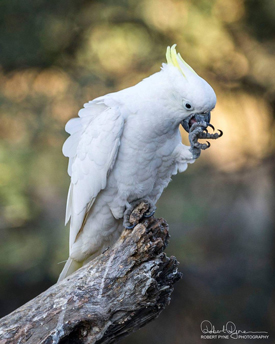
The sulfur crested cockatoo is a highly intelligent parrot found in Australia, New Guinea, some islands of Indonesia and Puerto Rico. (Photo: Robert Pyne CC)
Scientists call this handedness. That’s when one hand — or foot — is used consistently over the other for doing more complex tasks.
In a study of 16 Australian parrot species scientists found that about half were lefties, a third were righties, and a few were neither.
Handedness, once thought unique to humans, is also seen in chimps and gorillas — mostly righties — and orangutans — mostly lefties, as well as cats and kangaroos.
The evolution of handedness, for righties and lefties alike, improves skill and efficiency in complex tasks—for both parrots and for humans.
###
Written by Bob Sundstrom
Bird sounds provided by The Macaulay Library of Natural Sounds at the Cornell Lab of Ornithology, Ithaca, New York. Recorded by V Powys ML234725.
BirdNote’s theme music was composed and played by Nancy Rumbel and John Kessler.
Producer: John Kessler; Managing Producer: Jason Saul; Associate Producer: Ellen Blackstone
© 2019 Tune In to Nature.org February 2019/2020 Narrator: Michael Stein
ID# handedness-01-2019-02-07 handedness-01
CURWOOD: For pictures of these birds, fly on over to the Living On Earth website, loe.org.
Related links:
- BBC Earth News | “Parrots Prefer Left Handedness”
- Science Friday | “Do Other Animals Show Handedness?”
- Listen on the BirdNote® Website
The Place Where You Live: Tianmushan, China
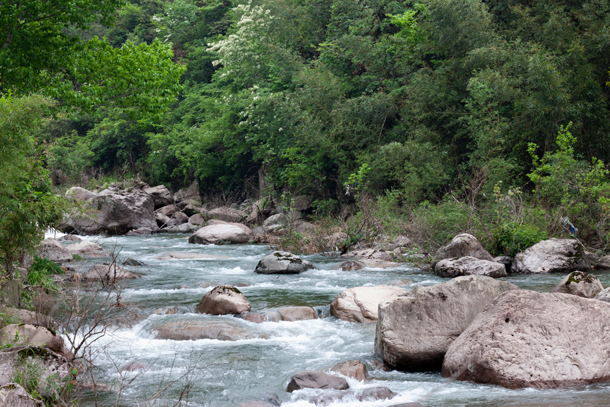
A river at flood stage in Tianmushan, Zhejiang Province, China. (Photo: Lindsay Shen)
CURWOOD: Now a trip to China for another installment in the occasional Living on Earth/Orion Magazine series “The Place Where You Live.” Orion invites readers to put their homes on the map and submit essays to the magazine’s website, and we’re giving them a voice.
[MUSIC: Edward Sharpe and The Magnetic Zeroes “Home” from Edward Sharpe and The Magnetic Zeroes (Rough Trade Records 2009)]
CURWOOD: Today’s essay by art historian Lindsay Shen takes us to the cool
mountain streams of Tianmushan, in Zhejiang Province.
[MUSIC]
[SOUNDS OF WATER RUSHING]
SHEN: The intelligent find joy in water. If Confucius is right, we must all be prodigies.
We moved to this mountain village, a three-hour drive from our home in Shanghai, because of the water, because of the air, because the inner-city pollution was quite literally making us sick. In moving to the country-side we were swimming against the tide; rural villages in China are draining, as young people migrate to the city for work. We joined a small trickle headed upstream, closer to the source of water.
Water isn’t magnetic, but it draws us to itself. All summer we swim in cool, deep channels, caressed by water heavy as silk. We slide down slick rockfaces into churning whirlpools. We climb to the sources of springs to collect water sweet to drink and fragrant with minerals. Outside Buddhist temples, we cleanse our hands and faces and souls with water.

Tianmushan is home to a UNESCO Biosphere Reserve. (Photo: Lindsay Shen)
[FROG SOUNDS]
SHEN: Later, we rescue frogs and turtles from the reservoir, half-believing their salvation earns us merit. Most of the time, living in this place feels like a respite from environmental woe; sometimes though we feel like we’re living on the front line. When we started visiting in 2007, the drive led through a village stacked with bales of garbage. The acrid smell of burning plastic seemed a defilement. After the massive typhoons that swept over the mountains each August, we would find the trees along the swollen rivers snagged with plastic, like multi-colored bunting for some dark parade. Once, playing with my two young sons ankle-deep in a stream, I caught sight of a young water serpent—delicious but deadly. Then realised, as it twisted downstream, that it was a plastic catheter attached to a needle, a dispatch of medical waste from some faraway place.
[MUSIC]

Lindsay Shen’s two young sons love to play in the clear pools of Tianmushan’s rivers. (Photo: Lindsay Shen)
SHEN: I attended village meetings where residents vented their frustrations. Such meetings were a tiny part of the collective anger and grief washing over China. The country’s later decision to restrict the waste it imported for recycling might be forcing other countries to look inward and confront their own consumption. But in places like Tianmushan it’s rare now to smell burning plastic. And common to share joy in water.
[MUSIC]
[SOUNDS OF WATER CONTINUE]
SHEN: When we saw Tianmushan, I think we were just immediately smitten, not only because it's a beautiful place, it's very mountainous. It's actually a UNESCO Man and Biosphere Reserve because of all of the rare species of plants and animals that are there in the mountain. In China, many of the main Buddhist temples have these historic documents associated with them, they’re the temple gazetteers. The one for Tianmushan talks about the water and how the waters of Tianmushan connect it to all of the sacred mountains throughout China. And so that was just another opportunity to really seep ourselves into the culture and spirituality of the place. Actually, in one summer, the water dried up, the drinking springs dried up, which seemed absolutely incredible because our whole experience of being at Tianmushan was of being surrounded by water, you know, gushing waterfalls, streams all around. We go to sleep to the sound of water, we play all day to the sound of water. And so it was incredible that the streams just dried up. There wasn't enough drinking water for everyone, and I think that was what probably precipitated the angriest meeting.
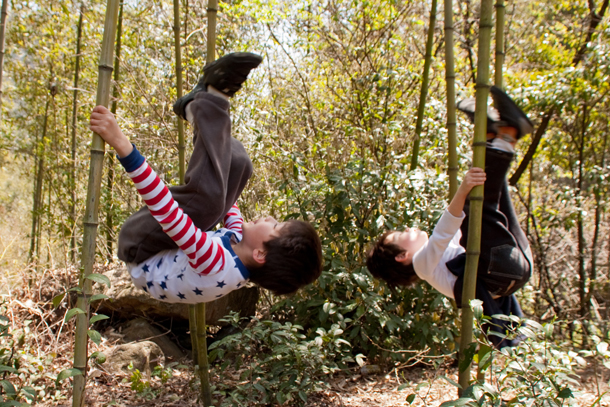
Tianmushan means “heaven’s eye mountain” because it has pools that look up to heaven. In a happy coincidence, Shen and her husband had named their sons Tian Yu, which means “rain from heaven”, and Tian Bai, which means “bright heaven”, before they knew of the existence of Tianmushan, so she says moving there felt like it was destined. (Photo: Lindsay Shen)
[MUSIC]
SHEN: However, I think that the displeasure was so great, that actually the willingness of those villagers to be vocal and to be heard has made an impact. There's such public support because people understand that their children need to grow up in a healthy environment.
CURWOOD: Lindsay Shen is an art historian in the mountains of Tianmushan, China. To learn how you can submit an essay for the Orion Magazine series the place where you live go to the living on earth website, loe.org.
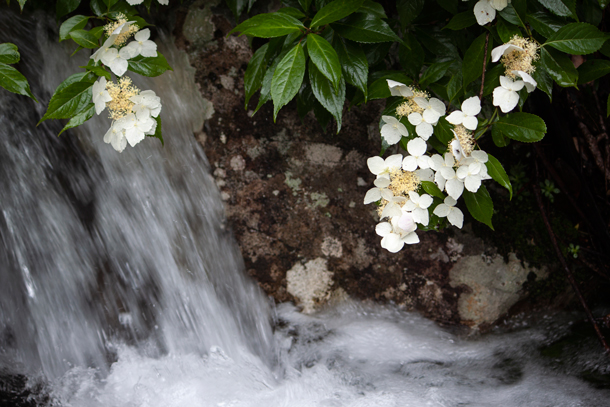
Tianmushan’s wet climate supports lush plant life. (Photo: Lindsay Shen)
Related links:
- Submit your essay on the Orion Magazine website
- Tianmushan is home to a UNESCO Biosphere Reserve
China’s Single-Use Plastics Ban

Single-use plastics are involved in everyday life in China. (Photo: Min G on Unsplash)
CURWOOD: China produces the most single use plastic of any country in the world, though it’s still behind the US in per capita plastic production. The largest landfill in China is full 25 years ahead of schedule and plastic waste is finding its way to waterways, to the outrage of many Chinese citizens. And the Chinese government seems to be taking the problem seriously. In 2017 they banned the import of most plastics for recycling. And now the country has announced a ban of single use plastics that starts phasing in this year and will broadly forbid the use of consumer single use plastics by 2025. Ma Jun is the director and founder of the Institute of Public and Environmental Affairs, a non-governmental organization in Beijing that has long advocated for holding polluters accountable. He spoke with Living on Earth’s Jenni Doering.
DOERING: Please tell us a little bit about the background of this ban. What led to China's ban on single-use plastics?
MA: China issued the first initial plastic ban years ago, at that time it was just the banning of ultra-thin plastic bags and also requiring all these department stores to charge for the use of plastic bags. There was a certain level of success but on the other hand, socio-economic development in China and the increasing affluent society started consuming far more plastic, especially in recent years, the e-commerce and online food delivery started generating a new round of plastic packaging. So, to tackle this new situation, the Chinese government issued this new plastic ban policy, which is a far more comprehensive response to the ongoing plastic crisis both in China and in the world.
DOERING: Yeah, that's right. I mean you use the word crisis -- what really makes this a crisis? I understand there's a lot of waste that gets you know, spread out into the environment from plastic waste; what's it like there in China?
MA: Yeah, the so-called white pollution caused by the plastic bags and other packaging and other products and styrofoams and all this have been contaminating the soil and also the water, like rivers, I mean much of that got dumped along the river banks and then being washed away into the water and among them, quite a percentage have been carried all the way into the coastal sea and eventually ended up in the big ocean. And we all know that this pollution can lead to an impact on the health of the ecosystem and on the animals and biodiversity and also eventually on public health as well. You know, now I think we understand that there's a cost to be paid. There's a real big consequence. So this plastic policy, I hope can be combined with what we call the Zero-waste Cities program in China because every year we generate over 200 million tons of all this waste food in the plastic, and we simply don't have enough land to dump them. The landfills are being used in a shocking speed.
DOERING: So how does the government plan on enforcing this plan to ban single-use plastics in China? And specifically, how is the government planning to enforce it on the local level?
MA: Yeah, that will be a challenge. In the first round of plastic ban, the success it's somewhat limited. There's a more kind of better enforcement in the big cities and in those higher and shopping malls, but in the farmers market, it was not very successful. And the big challenge now is for this new form of e-commerce, which reached out to hundreds of millions of consumers. And this time, I think the priorities should be given to hold major consumer product brands to hold them accountable. Of course, it's not only about imposing, you know, enforcement and imposing penalty fines on those who violate the policy, it's also about, you know, how to better tap into the market approach to try to collaborate with a business to try to motivate them for innovative solutions.

E-commerce has brought more challenges to plastic waste issues. (Photo: © wxrb.com)
DOERING: So, you know, they're banning single-use plastics with this action in China, but what will substitute the single-use plastic packaging?
MA: Yeah, plastic bags have been so extensively used because of all these advantages, so to try to substitute that the Chinese government is trying to promote the development of biodegradable plastic bags and containers. So, this is one solution. Of course, this is not perfect because these so-called biodegradable plastic bags or containers can only be decomposed under certain conditions. So, it's very important to have alternatives. You know, one of those is for us to switch to more refillable products. You know, when I was young, I grow up using that type of container. And, you know, we have not just the milk delivered in glass bottles to be returned and refilled. But also, even with soy source, or vinegar, they all came, you know, in glass bottles that we need to return and refill. It used to be the practice in those old times in China.
DOERING: I wonder what kinds of interaction you think could happen between efforts in different countries and how maybe innovation can be bolstered by these efforts in China as well as around the world?
MA: Yeah, I think global collaboration on combating plastic waste is extremely important, because plastic waste is somewhat unlike, you know the air and water pollution, which can be more local. This is a bit more like the climate change problem as a threat to the global common good. To try to respond to that it also needs more global cooperation. I hope that globally we could come up with more innovative solutions by collaborating, having the right policy to work with major businesses. I see a big potential there.
CURWOOD: Ma Jun of the Institute of Public and Environmental Affairs in China speaking with Living on Earth’s Jenni Doering.
Related link:
NYTIMES | "China Says It Will Ban Plastics That Pollute Its Land and Water"
[MUSIC: Inseeok Kang’s “Asian Zen Spa – Bianzhong” on Chinese Relaxation and Meditation Music: Sounds of Asian Instruments for Mental Journey, Chakra Balancing, Relax Your Mind…]
Armistice for Hippos and Crocs
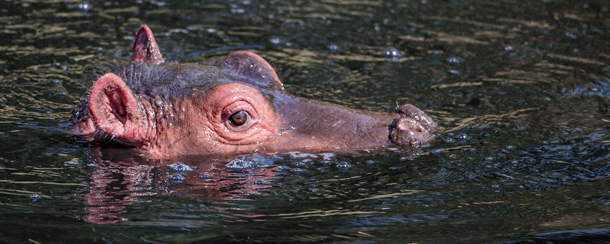
A hippo raises its head out of the waters of the Sekenani River. (Photo: Mark Seth Lender)
CURWOOD: Healthy rivers are typically teaming with life, a vital habitat for all sorts of creatures great and small. And on the Sekenani River in Kenya Living on Earth’s Explorer in Residence, Mark Seth Lender, found a delicate balance there between two of the most powerful animals.
Ghetto
Hippopotamus and Crocodile
Sekenani River, Maasai Mara
© 2020 Mark Seth Lender
All Rights Reserved
A pod of hippopotamus crowds itself into the bag end of the river. They can go no further without leaving the comfort of water which when the sun is high they prefer not to do. There is more river to be had, downstream. But around the bend crocodiles cozy up to the banks and pull themselves onto the gently sloping beaches and the shoals. They lie there as still as sleep; they are not sleeping. They strike, faster than seems possible on those low bent legs and make a short quick meal of any who come down to drink without due caution.
Not that the hippos care about that.
No hippopotamus full-grown fears any dimension or demeanor of crocodile especially here, where they snort and blow and heave like three-to-a-bed, twenty-one to a small and airless room. No crocodile would leave the safety of open water to wedge his way into that. And yet the hippopotamus keep apart from them. They have long memories, the hippos do. Perhaps they can recall when a croc came to take their newborn young. And whether the outcome was blood or only terror they neither forgive nor do they forget.
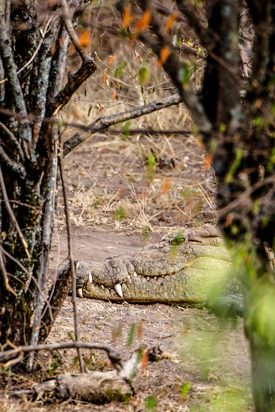
A crocodile is nearly camouflaged in its environment. (Photo: Mark Seth Lender)
At night, and sometimes during the day crocodiles crawl out, beyond the river’s edge, over the bank and into the sedges and reeds. There they are almost impossible to see even in daylight. And in the night, invisible. Also at night and sometimes late in the day hippopotamus with remarkable grace, leave the sanctuary of water and spread out upon the near plains to graze. Hippos and crocs. They share the river because they must and cannot escape each other even on dry land. Nothing passes between them. They see each other only as much as they have to, as little as they can. And achieve in these dry hard crowded days, Armistice.
Though never Amnesty.
CURWOOD: Living on Earth’s explorer in residence, Mark Seth Lender. For pictures trek over to the Living on Earth website, loe.org
Related links:
- Sekenani Camp, Maasai Mara
- More from Mark Seth Lender
[MUSIC: Sona Jobarteh & Band - Kora Music from West Africa]
CURWOOD: Coming up – A look at Koch Industries and its successful war on environmental regulations. That’s just ahead on Living on Earth.
ANNOUNCER: Funding for Living on Earth comes from you, our listeners, and United Technologies, combining passion for science with engineering to create solutions designed for sustainability in aerospace, building industries, and food refrigeration. UTC companies such as Otis, Carrier, Pratt and Whitney, and UTC Aerospace systems are helping to move the world forward. You can learn more about United Technologies by tuning into the Race to Nine Billion podcast; listen at racetoninebillion.com.
[CUTAWAY MUSIC: Sona Jobarteh & Band - Kora Music from West Africa]
Kochland: The Secret History of Koch Industries and Corporate Power in America
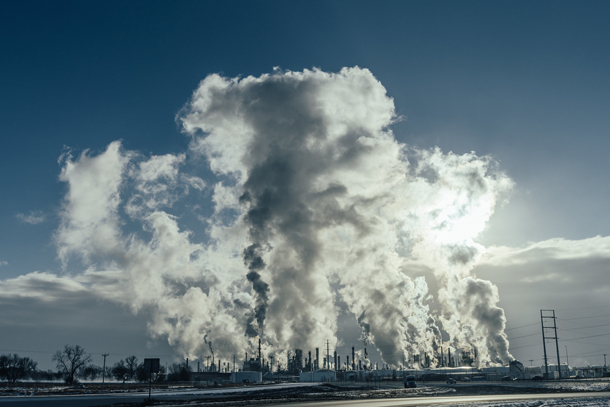
In 1998, Koch Industries was fined $6.9 million for illegally releasing heavily polluted wastewater from its Pine Bend oil refinery in Minnesota. (Photo: Tony Webster, Flickr CC BY 2.0)
CURWOOD: It’s Living on Earth, I’m Steve Curwood.
For decades now, climate policy has been stymied in the United States by a well-funded campaign of denial that includes elected officials dependent on campaign contributions from fossil fuel interests. And much of these anti-climate regulation interests can be traced back to one powerful man, Charles Koch. Charles Koch built the company he inherited from his father Fred into a financial powerhouse based on oil and gas all the way from the well to the pump. Koch Industries earned Charles and his late brother David massive fortunes of as much as one hundred billion dollars. The new book “Kochland: The Secret History of Koch Industries and Corporate Power in America” chronicles the rise of this behemoth and shows how it has shaped American society. Author Christopher Leonard joined us to discuss his book at a “Good Reads on Earth” event in Boston.
CURWOOD: Let's see. Can you walk us through how Charles Koch built this empire, and particularly the central role of the oil and gas industry in all of this? And you start at the beginning by mentioning that when the private equity boys came by to talk to him about expanding his daddy's company, he said nyet. Why did Charles Koch not want to get involved with other investors, private equity, the stock market, but he just had to have this all to himself.
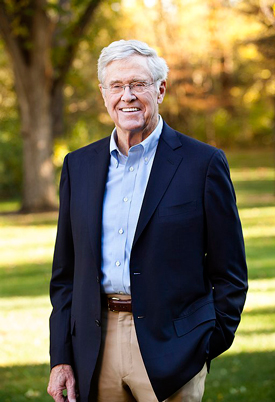
Charles Koch inherited the Koch company in 1967 at the age of 32, and over decades has massively grown Koch Industries into the second largest privately-held company in the U.S. (Photo: Gavin Peters, Wikimedia Commons CC BY-SA 3.0)
LEONARD: So first of all, let's look at what this organization is today.
CURWOOD: Okay.
LEONARD: Koch Industries is one of the largest private companies in the United States. Their annual sales are larger than that of Facebook, Goldman Sachs and US Steel combined. And this is a company that specializes in the sort of businesses that underpin civilization. They refine the fuel people use to drive to work. They make the synthetic carpet fibers in this carpet. They make the wall paneling and the building materials; they make the glass windows of this wall; they make the sensors in our cell phone. They make nitrogen fertilizer, they're the third or fourth largest producer of nitrogen fertilizer in the world, which you and I don't think we buy, but that's at the literal foundation of our food system. So if you eat, Koch Industries is almost certainly making a profit off of that activity. So these businesses are extraordinarily profitable, and the company is a huge player in them. So how did this happen? Well, when Charles Koch took over the company in '67, it was this kind of motley assortment of different assets. Almost all of them in the fossil fuels business. They had a large share in an oil refinery. They had pipelines. They were the largest crude oil gathering company in the United States, meaning, they were the company that would go out to the oil well, gather the oil and take it to market. So it's critical to note they started in fossil fuels and processing fossil fuels. That determined the direction of the entire empire from there. But from the minute he took over, at the age of 32, Charles Koch was just determined to shape this company to his vision. And he had this view that, first of all, we're going to remain privately owned. Charles Koch knew that if he had outside shareholders, they would be bugging him every quarter, how much money did you make this quarter? And he did not want that interference. So you mentioned a scene where these bankers from New York came in 1981 and tried to convince him to take the company public, which would have given him a massive, roughly $56 million payday overnight, and he sent them packing because he had this vision. And I gotta tell you, the shareholders of Koch Industries, meaning two people, benefited greatly from that decision.

Koch Industries transports crude oil and other products around the world. (Photo: Timo Adam, Flickr CC BY-NC-ND 2.0)
CURWOOD: Tell me what you saw when you went up to see Charles Koch's office.
LEONARD: Yeah, so the company headquarters is in Wichita, Kansas on the northwest corner of town. And it's a dark limestone building with black windows, it looks like an opaque, obsidian black cube. And that's not accidental. That really reflects this firm's modus operandi, they're strategically secretive. The secret to their success is that they know more about the world than other people, and they keep what they know very close to their vest, and then they execute on what they know, to their benefit. So you can see that, that this man, Charles Koch, spends his days at the apex of this massive corporate empire, that literally spans the globe, that he's been building for 50 years. And you know, when I walked into the office after all that security and he stands up and looks at me -- and again, I wouldn't even want to know what an hour of his time is worth. It's definitely more than I get paid in a matter of years, almost certainly. And he gets up and looks at me and says, "Oh, hey, Chris, good to meet you. You didn't need to wear a tie to come talk to me." And he's got this very avuncular, kind, modest persona, that he projects. And interviewing people who've worked with him over the decades, that's exactly the person they encountered too. And it engendered a lot of loyalty in the people who worked for him, I mean, he, he doesn't pound his fist on the table. He doesn't denigrate people who work for him. He's pretty merciless. He's pretty exacting. He's pretty relentless. But he's not, you know, cruel or arbitrary. And he holds himself, I think, to the, the same exacting high standards that he holds his lieutenants to.
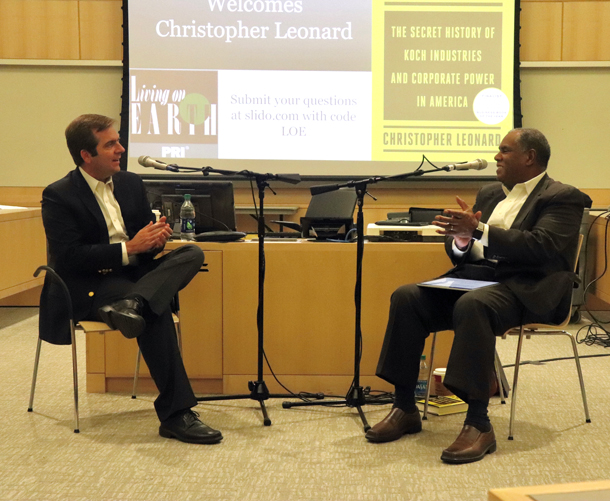
Living on Earth Host Steve Curwood (right) interviewed Kochland author Christopher Leonard at the University of Massachusetts Boston as part of the Good Reads on Earth live event series. (Photo: Jay Feinstein)
CURWOOD: Now obviously, doing gas and oil, Koch Industries were never going to be the favorite of environmental activists. But you write that early on, that Charles Koch learned his lesson about breaking environmental laws and worked hard to never do so again. Walk us through the environmental violations that happened at the Pine Bend refinery under Charles Koch's watch, and how that influenced his strategy going forward.
LEONARD: Yeah, so this was during the 1990s, and, and this is important. Charles Koch, as I said, he has this very particular vision, and he's codified it in this philosophy at the company called market-based management that has all these buzzwords, like "process owners". Well, the way people on the ground interpreted this philosophy was, profits overall. Get as much profit out of this machinery as, as you can. And you saw that kind of pathological response across the company during the 1990s. Here's what happened at Pine Bend, is you've got this massive oil refinery that is breathtakingly profitable. You and I are in the wrong line of work, we should have owned oil refineries. They make a lot of money. But a machine inside this refinery broke down, and it began to emit massive amounts of toxic ammonia. So the managers had a choice. They could divert the ammonia out into the Mississippi River as they were supposed to do, but they would have violated their permit levels and faced fines and increasing consequences from environmental regulators, escalating fines and a possible shut down. Or they could have shut the refinery down, turned it off, essentially, or at least turned off certain machines and figured out what the problem was. Well, they chose a third option, which was to dump the ammonia-polluted water out of a fire hose system out of the back of the refinery and into nearby wetlands. I mean, to the tune of hundreds of thousands of gallons a night of toxic water. And that chapter shows how an environmental engineer at the plant named Heather Faragher tried to get her bosses to stop and was sidelined, marginalized, and ignored as they continued to break the law. They were eventually caught and fined a record criminal fine by the US Department of Justice. Now, as this was happening, Koch was levied a record-breaking fine for pipeline leaks, hundreds of pipeline leaks, with the same kind of mentality behind it, that they didn't want to shut down the pipelines, they weren't reinvesting in the pipelines. They were running full-throttle, if you will, at a refinery in Texas, one of the machines was emitting carcinogenic benzene, and they didn't shut it down and a manager falsified reports to environmental regulators, another criminal case. You saw this across the company. Now, to their credit, in 1999, Charles Koch brought in all his top leadership and he said, this is going to stop. They fired virtually every division president in the company, fired them all.
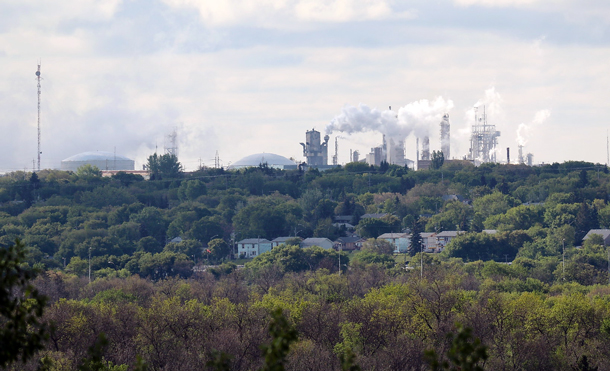
Koch Industries’ fertilizer plant in Brandon, Manitoba. (Photo: Robert Linsdell, Flickr CC BY 2.0)
They hired in new people. They restructured the company. And Charles Koch imposed this new theory called 10,000 Percent Compliance, which is that 100% of the people are going to comply with the law 100% of the time. Now, this sounds like a bunch of corporate buzzwords, but it's a real thing. I feel confident saying that. And these days you don't hear about explosions at Koch refineries, or massive pipeline spills. There are problems, I'm not trying to sugarcoat it; the book shows that, you know, at Georgia Pacific workplace injuries have been on the rise since 2012, it's not perfect. But they took complying with the law very, very seriously. And it wasn't just out of the idea that they're going to be a good Samaritan. It was this idea that, keep the regulators off our property, no more Feds, no more lawsuits. We're going to make our money by knowing more about the world than anybody else knows and executing against that knowledge, meaning, we're going to buy assets that people undervalue, we're going to own them. We're going to improve their operations and make a ton of money. And I don't want criminal cases, this is Charles Koch thinking, he did not want criminal cases interrupting that strategy.
CURWOOD: And of course, he had the apparatus to change the regulations. If he doesn't want cap and trade, do the lobbying in Washington to be sure that it doesn't go through. If he wants to have a less ferocious EPA, then do the lobbying to defang the EPA.
LEONARD: You're bringing up a really good point. You know, I think the most important thing that you're pointing to is this issue of carbon emissions and greenhouse gas emissions, okay? Yes, Koch complies with the law at its plants. But the law determines what markets are. And right now, it is free to emit greenhouse gases. There's no price put on it. And any costs associated with that are borne by people around the world, not by the companies that necessarily emit the greenhouse gases. And you know, I remember interviewing this top lobbyist at Koch. And I really wanted to understand how they lobby, why they're good at their job, what they care about. And I said, "What got you up in the morning? What was your front-burner issue?" And he said, carbon.

A Georgia-Pacific lumberyard in Oregon. Koch Industries acquired the pulp and paper company in 2005. (Photo: Max Rae, Flickr CC BY-NC-ND 2.0)
CURWOOD: Well, that's right. I mean, you write about in 2010, Waxman-Markey, the cap and trade bill, passes the House and just gets stalled in the Senate, in no small measure due to pressure from the Koch lobbyists. Please describe that political influence campaign and why the Koch affiliates, what they did to just kill Waxman-Markey and why was so important to them.
LEONARD: This was a really huge moment in history for, for everybody. This was the last best chance to regulate greenhouse gas emissions, and it came really close to happening. So, as background, we've got to remember, this seems like a different world, but in 2008, the Democratic candidate Barack Obama and the Republican candidate John McCain agreed climate change is a dire issue and we need to do something about it. That was a very dangerous moment for Koch. If a price was put on carbon, it could really be a death knell for Koch's fossil fuel business. Because, think about how much money Koch Industries has invested in just the physical infrastructure of processing crude oil. Koch owns two of the largest oil refineries in the United States. It owns pipeline networks that transport fuel. It is one of the largest traders in crude oil supplies and other energy supplies in world markets, meaning it's leasing super tankers of oil to go from the Persian Gulf to the Gulf of Mexico.

Koch companies produce everything from oil, to toilet paper, to carpet fibers. (Photo: Andre Roberto Doreto Santos, Flickr CC BY-NC-ND 2.0)
It is deeply invested. Now if a price is put on carbon, that is going to reduce demand for those fossil fuels. The value of all those assets I just described is going to fall. The volume of fuels that are processed are going to fall, and we're talking a price tag measured in T, trillions of dollars over a period of 40 years. So this is a do-or-die effort. And in 2009, as you mentioned, it really looked like Congress was going to create a regulatory framework called cap and trade, which was a Republican idea, a conservative idea, that would put a price on the pollution and let people trade against it, essentially. Koch moved in at the most opportune time for their interests, which is when this bill moved from the House to the Senate. And I'll just use one example of how they did it. First of all, they'd been working diligently for years, decades really, to politicize the issue, to make it seem that if you are concerned about climate change, you're a power-hungry, tyrannical liberal. And you know, one of the people in the book is a conservative Republican from South Carolina named Bob Inglis, who was as conservative as a person could be, but realized the science behind climate change is really undeniable. And Koch primaried him out of office. They raised up a competitor, they quit giving him money. They ran ads against politicians like that, and helped drive him out of office. And what they did was they made it politically untenable for Republicans to even acknowledge that climate change is real. In essence, big picture, that's what they did. They have a lot of very interesting mechanisms by which they can do that. Koch will secretly fund a study that comes out without Koch's name on it. Then they take the findings of those studies. They have them read into the record of the Congressional hearing, then they can have another think tank do political ads based on those findings, that are then targeted at vulnerable senators like Lindsey Graham in South Carolina. Those vulnerable senators are identified by Koch's massive network of lobbyists, and they can use this machine to create pressure and heat. And what they did was they drove all moderate Republicans off the field and made sure it was the Democrats trying to do this alone. And by doing that they raised the heat to such a temperature in the Senate, that the bill died a quiet and ignoble death. And that's what's so interesting to me about it. It's not like there was this big proclamation, like, this bill is dead. It just stops, and takes on water, and then disappears. And so it's sort of an easy victory, if you will.
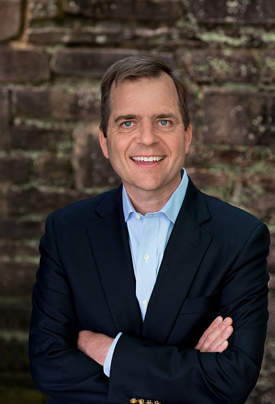
Christopher Leonard is a business reporter whose work has appeared in The Washington Post, The Wall Street Journal, Fortune, and Bloomberg Businessweek. He is the author of The Meat Racket and Kochland. (Photo: Seth Rubin)
CURWOOD: Some people listening to us have very strong feelings about Charles Koch and the Koch empire, they say, it's the evil empire, that these are horrible people, they're trying to destroy our society; pretty strong language. What did you come away from writing this book and meeting Charles Koch with, what did you come away with?
LEONARD: Well, I am in awe of what Charles Koch has built. And listen, I don't mean to cop out, I really feel like my job is to describe what happened; the value I can bring is getting inside the organization and reporting to you accurately what they did, how they think, and what's going on. So here's what I take away, just personally, it is so easy to underestimate the people inside Koch Industries. I was blown away by the level of sophistication and intelligence that exists inside of that institution. And the chapters toward the end of the book about politics are disturbing. I don't mind saying that. I mean, they burned down the moderate wing of the Republican Party, and we're all living with the consequences of that, and I won't sugarcoat it. But at the same time, you know, agree or disagree with their political goals, this really is a case study in long term strategic thinking. And our country, our politics, and our business, you know, long term strategic thinking is in desperately short supply in those fields. And this is a really great case study of a group that had a plan and stuck with it over decades. So, you know, I think it's easy to condemn and try to turn them into cartoonish villains when they're really not. You know, the people who work for Charles Koch really admire this guy, and he's a human being. Now, I think the rub is that he's a profoundly powerful human being. And when that much power is concentrated in the hands of one or a few people, you can have pretty negative side effects and consequences from it.
CURWOOD: Christopher Leonard is a business reporter and author of Kochland: The Secret History of Koch Industries and Corporate Power in America. Thank you so much for taking the time to talk with me today.
LEONARD: Thank you. I appreciate it.
Related links:
- Kochland: The Secret History of Koch Industries and Corporate Power in America
- Koch Industries’ Business Philosophy
- Christopher Leonard’s author website
- About New America, which supported the writing of Kochland
[MUSIC: Bireli Lagrene, “Place du Tertre” on The Rough Guide To the Music Of Paris (originally on Move), (Rough Guide/World Music Network)]
CURWOOD: Living on Earth is produced by the World Media Foundation. Our crew includes Naomi Arenberg, Bobby Bascomb, Paloma Beltran, Thurston Briscoe, Jenni Doering, Jay Feinstein, Merlin Haxhiymeri, Don Lyman, Isaac Merson, Aynsley O’Neill, Jake Rego, Anna Saldinger, Candice Siyun Ji, and Jolanda Omari. Special thanks this week to Nick Wood and Sekenani Camp. Tom Tiger engineered our show. Alison Lirish Dean composed our themes. You can hear us anytime at L-O-E dot org, iTunes and Google play- and like us, please, on our Facebook page - Living on Earth. We tweet from @livingonearth. And find us on Instagram at livingonearthradio. I’m Steve Curwood. Thanks for listening!
ANNOUNCER: Funding for Living on Earth comes from you, our listeners, and from the University of Massachusetts, Boston, in association with its School for the Environment, developing the next generation of environmental leaders. And from the Grantham Foundation for the protection of the environment, supporting strategic communications and collaboration in solving the world’s most pressing environmental problems. Support also comes from the Energy Foundation, serving the public interest by helping to build a strong, clean, energy economy.
ANNOUNCER 2: PRX.
Living on Earth wants to hear from you!
Living on Earth
62 Calef Highway, Suite 212
Lee, NH 03861
Telephone: 617-287-4121
E-mail: comments@loe.org
Newsletter [Click here]
Donate to Living on Earth!
Living on Earth is an independent media program and relies entirely on contributions from listeners and institutions supporting public service. Please donate now to preserve an independent environmental voice.
NewsletterLiving on Earth offers a weekly delivery of the show's rundown to your mailbox. Sign up for our newsletter today!
 Sailors For The Sea: Be the change you want to sea.
Sailors For The Sea: Be the change you want to sea.
 The Grantham Foundation for the Protection of the Environment: Committed to protecting and improving the health of the global environment.
The Grantham Foundation for the Protection of the Environment: Committed to protecting and improving the health of the global environment.
 Contribute to Living on Earth and receive, as our gift to you, an archival print of one of Mark Seth Lender's extraordinary wildlife photographs. Follow the link to see Mark's current collection of photographs.
Contribute to Living on Earth and receive, as our gift to you, an archival print of one of Mark Seth Lender's extraordinary wildlife photographs. Follow the link to see Mark's current collection of photographs.
 Buy a signed copy of Mark Seth Lender's book Smeagull the Seagull & support Living on Earth
Buy a signed copy of Mark Seth Lender's book Smeagull the Seagull & support Living on Earth

